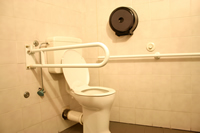Ensuring Safety Throughout your Home

As you walk through your home, take notice of the different appliances, light fixtures, decoration, etc., that may cause injury. This page provides a room-by-room breakdown of potentially hazardous objects to avoid in your home.
Before reading the content on this page, it may be beneficial to review the following video(s) from the Office of Rural Health (ORH).
Home Safety Tips
Length: 04:35 (Link opens to new page)
Nurse goes into detail about home safety.
Avoiding Falls 
Preventing falls is an important safety goal. To do so, it is important to avoid clutter and remove cords or loose rugs from walking areas. Also, remember to have good lighting throughout the home, especially in stairwells. If your loved one gets up at night, consider placing night lights along the hallways and in bathrooms.
Home Fire Safety
Home fire safety includes checking smoke alarms at least twice a year to make sure they are working. Many recommend making it a habit to check smoke alarms on daylight saving time dates (March & November). Have an emergency fire plan that includes an evacuation route. Note that it is not recommended to allow your loved one access to matches, barbeque equipment, or electric heaters without supervision.
Room by Room Safety Tips
Kitchen Safety
- Appliances such as stoves, ovens, and microwaves are a burn risk and a fire hazard. Consider removing knobs from the stove, installing childproof knobs, or installing an automatic shut-off switch.
- Store prescription medications in a locked cabinet if kept in the kitchen.
- Do not store flammable liquids in the kitchen.
- Remove or secure any junk drawers as your loved one may rummage in them or eat small items such as matches, hardware and plastics.
- Consider disabling the garbage disposal as people with dementia may place objects or their hands down in the disposal.
Bathroom Safety 
- Improve safety by adding grab bars, shower chairs, a hand-held shower head and other adaptive equipment.
- Avoid leaving loved one with severe dementia unattended in the bathroom.
- Remove locks from some doors, such as in the bathroom, to prevent your loved one from locking him or herself in these rooms.
- Use nonskid mats or carpeting to prevent slipping and falls.
- Adjust the water heater to 120 degrees to avoid scalding temperatures.
- Remove or lock up bathroom cleaning supplies.
Bedroom Safety
- Move the bed against the wall for increased security.
- Use caution with any type of electric heaters, such as heating pads, to avoid burns or injuries. Keep the controls out of reach.
Outside Home Safety
- Consider using bright or reflective tape to mark the edges of outside steps.
- Install handrails and ramps to reduce the risk of falls.
- Install lights with automatic sensors to improve visibility at night.
- Restrict swimming pool access by keeping it gated or locked.
- Consider placing a no soliciting sign at the front door or gate.
- Prune bushes away from walkways, handrails and doorways.
This may seem like a long list of things to do. To make the home safety precautions more manageable, you may want to prioritize and begin with the ones that are most immediately needed. However, if possible try to stay ahead of the game and don’t wait for an accident before making some of these changes.
Some communities have programs to help elders or persons in need make minor modifications to their home. Make sure anyone who comes into your home for home modifications is reputable.
Additional Resources 
VA Resources 
US Department of Veterans Affairs
VA values your commitment as a partner in our pledge to care for those who have "borne the battle." We have several support and service options designed with you in mind. The programs are available both in and out of your home to help you care for yourself and the Veteran you love.
- Caregiver Support Network
- VA Caregiver Support Line: 1-855-260-3274
- Additional Tips & Tools: Managing Medicines, Talking with your Provider, Caring for Oneself, Disaster Planning, Staying Organized, Moving Around Safely
Geriatrics and Extended Care Services (GEC) is committed to optimizing the health and well-being of Veterans with multiple chronic conditions, life-limiting illness, frailty or disability associated with chronic disease, agining or injury. This VA site reviews information on delirium, dementia and Alzheimer's care, decision making, home and community based services, and advance care planning, among many other important topics that may be important for you as a caregiver.
Veteran's Crisis Line Phone: 1-800-273-8255 (Veterans Press 1)
The VA does not endorse the following resources or guarantee that their information is 100% accurate. However, you may be able to find some helpful information by visiting the following pages:
Alzheimer's Association: Alzheimer's and Dementia Caregiving Center
Find out more information on Home Safety Tips.
References: Information adapted from Alzheimer’s Association and Office of Rural Health
If you have any questions or concerns, contact Dementia Caregiver Web Support.



















